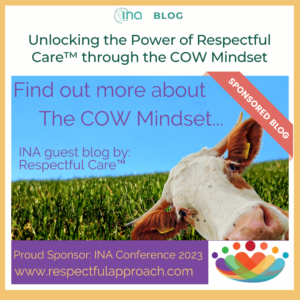 By Danielle McLellan-Bujnak of Respectful Care
By Danielle McLellan-Bujnak of Respectful Care
A “COW Mindset” means that we intentionally incorporate Curiosity, Openness, and Wonder into our interactions with infants and children on a daily basis. The “COW Mindset” sounds fun and even a bit silly, and I chose the term for its whimsy to make it memorable, as well as for its obvious connection to friendly farm animals. So what exactly does the COW Mindset mean in our everyday work with infants and children?
C: Curiosity is the foundational aspect of the COW mindset. Asking open-ended questions, encouraging exploration, and modeling a perspective of inquiry can all help to promote a child’s natural desire to learn and understand the world around them, and by being curious, we also can learn more about the children we care for and understand their unique strengths, interests, and needs.
For example, if we notice that a child shows an interest in dogs, we can get books about dogs from the library, talk to neighbors and friends who have dogs and if appropriate ask to spend time with their dog or take their dog for a walk, or even take the child to a dog park or an animal shelter, as well as offering age-appropriate artistic, literacy and math activities around themes relating to dogs. We can create an environment that supports the child’s own learning and exploration by being curious ourselves, and by showing an interest in the world around us – including the children themselves.
O: Openness is another crucial component of the COW mindset. Being open means embracing differences and accepting the child for who they are, without judgment or assessment according to preconceived ideas. For example, if a child has a different family structure than what we are used to, we can be open and accepting of their family, and even learn from their unique perspective.
Basing our professional work on diverse funds of knowledge around child development is a key factor in a mindset of openness. In the case of a child whose family participates in different social identities than ours, when the child is upset a nanny who has an open mindset can listen attentively, validate the child’s emotions, and help them to come up with solutions or coping strategies that are valid within their family’s cultural value system. Further, by being open and communicating clearly (and age-appropriately) about our own emotions and feelings, a nanny can model healthy emotional expression and help children to learn how to regulate their own emotions.
W: Wonder is the third dimension of the COW mindset. Wonder involves seeing the world through a child’s eyes, and appreciating the beauty and magic of everyday moments – including in the children themselves. By cultivating wonder, nannies can get to know children more deeply, as well as help children maintain their innate sense of awe and appreciation for the world around them.
A nanny’s own wonder promotes creativity and imagination in the child, and encourages imaginative play and the development of the child’s own creative ideas. For example, on a daily walk or drive to school, a nanny can express their own sense of wonder by noticing a changing plant or tree throughout the seasons, or by speculating some fantastical possible life stories of people who are sitting outside a cafe.
So what are some of the specific benefits of incorporating all three of these COW attributes on an everyday basis?
- The COW Mindset promotes learning: When we approach our work with Curiosity, we are more likely to ask questions, seek out information, and explore new ideas. Continuous learning and helps us stay up-to-date with the latest research and best practices in supporting children’s healthy development.
- The COW Mindset encourages creativity: A mindset of Openness encourages us to approach problems and challenges with a clear mind, and to feel motivated and excited to explore a variety of solutions. This fosters creativity and innovation, and helps us find new and effective ways to support children’s growth and development.
- The COW Mindset supports individuality: A mindset of Openness also allows us to appreciate the unique qualities and perspectives of each child, and to create an environment that supports and nurtures their individual interests and strengths. This promotes a sense of belonging and acceptance, and helps children develop a positive self-image.
- The COW Mindset promotes positive relationships: A mindset of Wonder helps us build strong, positive relationships with children. When we approach our work with a sense of awe and appreciation, we recognize children’s competence. We are more likely to connect with children on a deep and meaningful level, and to respond to their emotional and social needs with empathy and compassion.
- The COW Mindset fosters joy and fulfillment: Finally, having a mindset of Curiosity, Openness, and Wonder can help us find joy and fulfillment in our work. Caring for children can be demanding and challenging work, and it can also be incredibly rewarding and fulfilling. By approaching our work from a foundation of wonder and appreciation, we are more likely to find joy and satisfaction in our interactions with children, and to be motivated to continue learning and growing as professional caregivers.
—————
Check out more resources from Respectful Care™:
1. Introductory & Advanced Respectful Care™ courses for caregivers: www.respectfulapproach.com
2. Read Danielle’s brand-new ebook for free with Kindle Unlimited! https://a.co/d/150GmGP
3. Also, please stop by our vendor table at the INA Conference to say hi, and tell me about what Respectful Care™ means FOR YOU!
